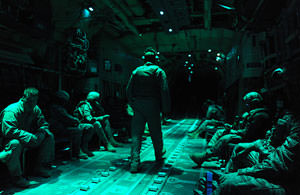Declare Victory — and Leave
Slender threads of hope are nice but do not constitute a plan. Nor do they justify continuing to pour American lives and resources into the bottomless pit of Afghanistan.
Slender threads of hope are nice but do not constitute a plan. Nor do they justify continuing to pour American lives and resources into the bottomless pit of Afghanistan.
Ryan Crocker, the veteran diplomat nominated by President Obama to be the next U.S. ambassador in Kabul, gave a realistic assessment of the war in testimony Wednesday before the Senate Foreign Relations Committee. Here I’m using “realistic” as a synonym for “bleak.”
Making progress is hard, Crocker said, but not hopeless.
Not hopeless.
What on earth are we doing? We have more than 100,000 troops in Afghanistan risking life and limb, at a cost of $10 billion a month, to pursue ill-defined goals whose achievement can be imagined, but just barely?
The hawks tell us that now, more than ever, we must stay the course — that finally, after Obama nearly tripled U.S. troop levels, we are winning. I want to be fair to this argument, so let me quote Crocker’s explanation at length:
“What we’ve seen with the additional forces and the effort to carry the fight into enemy strongholds is, I think, tangible progress in security on the ground in the south and the west. This has to transition — and again, we’re seeing a transition of seven provinces and districts to Afghan control — to sustainable Afghan control. So I think you can already see what we’re trying to do — in province by province, district by district, establish the conditions where the Afghan government can take over and hold ground.”
Sen. Jim Webb, D-Va., a Vietnam veteran and former secretary of the Navy, pointed out the obvious flaw in this province-by-province strategy. “International terrorism — and guerrilla warfare in general — is intrinsically mobile,” he said. “So securing one particular area … doesn’t necessarily guarantee that you have reduced the capability of those kinds of forces. They are mobile; they move.”
It would require far more than 100,000 U.S. troops to securely occupy the entire country. As Webb pointed out, this means we can end up “playing Whac-A-Mole” as the enemy pops back up in areas that have already been pacified.
If our intention, as Crocker said, is to leave behind “governance that is good enough to ensure that the country doesn’t degenerate back into a safe haven for al-Qaida,” then there are two possibilities: Either we’ll never cross the goal line, or we already have.
According to Obama’s timetable, all U.S. troops are supposed to be out of Afghanistan by 2014. Will the deeply corrupt, frustratingly erratic Afghan government be “good enough” three years from now? Will Afghan society have banished the poverty, illiteracy and distrust of central authority that inevitably sap legitimacy from any regime in Kabul? Will the Afghan military, whatever its capabilities, blindly pursue U.S. objectives? Or will the country’s civilian and military leaders determine their self-interest and act accordingly?
Democrats on the Senate Foreign Relations Committee issued a report this week warning that the nearly $19 billion in foreign aid given to Afghanistan during the past decade may, in the end, have little impact. “The unintended consequences of pumping large amounts of money into a war zone cannot be underestimated,” the report states.
The fact is that in 2014 there will be no guarantees. Perhaps we will believe it incrementally less likely that the Taliban could regain power and invite al-Qaida back. But that small increment of security does not justify the blood and treasure that we will expend between now and then.
I take a different view. We should declare victory and leave.
We wanted to depose the Taliban regime, and we did. We wanted to install a new government that answers to its constituents at the polls, and we did. We wanted to smash al-Qaida’s infrastructure of training camps and safe havens, and we did. We wanted to kill or capture Osama bin Laden, and we did.
Even so, say the hawks, we have to stay in Afghanistan because of the dangerous instability across the border in nuclear-armed Pakistan. But does anyone believe the war in Afghanistan has made Pakistan more stable? Perhaps it is useful to have a U.S. military presence in the region. This could be accomplished, however, with a lot fewer than 100,000 troops — and they wouldn’t be scattered across the Afghan countryside, engaged in a dubious attempt at nation-building.
The threat from Afghanistan is gone. Bring the troops home.
Eugene Robinson’s e-mail address is eugenerobinson(at)washpost.com.
© 2011, Washington Post Writers Group
Your support matters…Independent journalism is under threat and overshadowed by heavily funded mainstream media.
You can help level the playing field. Become a member.
Your tax-deductible contribution keeps us digging beneath the headlines to give you thought-provoking, investigative reporting and analysis that unearths what's really happening- without compromise.
Give today to support our courageous, independent journalists.









You need to be a supporter to comment.
There are currently no responses to this article.
Be the first to respond.